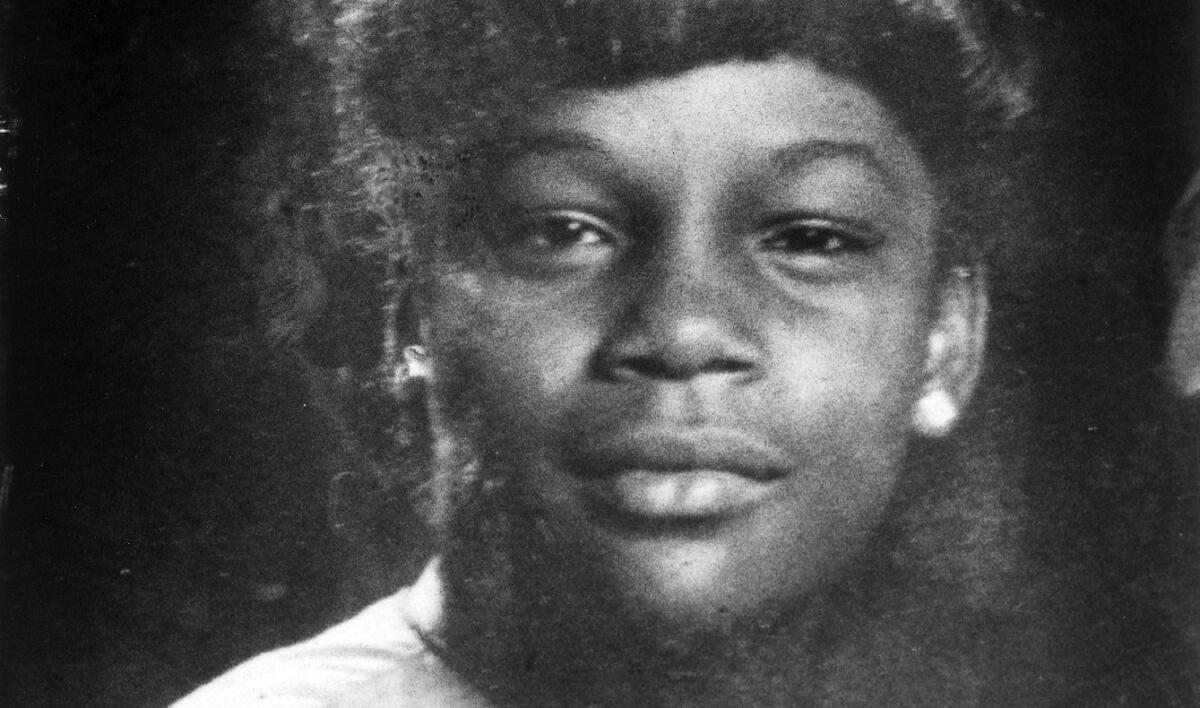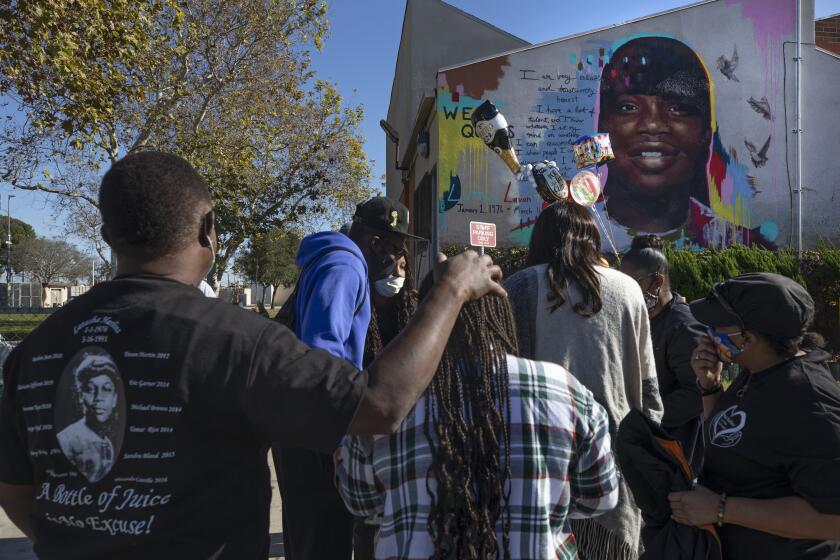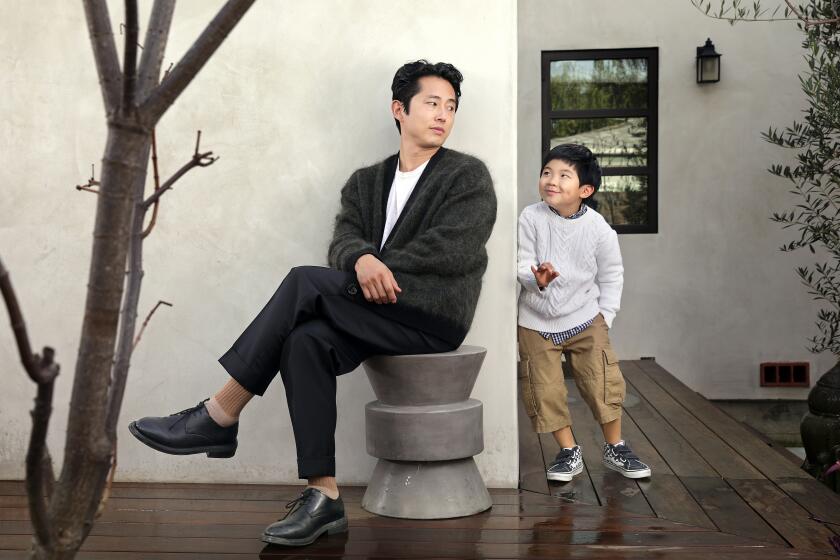The heartbreaking L.A. story behind Oscar nominee ‘A Love Song for Latasha’

- Share via
It was a hot summer day when Tybie O’Bard ventured to a pool in South Central Los Angeles. The sixth-grader had decided to teach herself how to swim.
Staying close to the edge, she tried to doggie paddle. A group of boys noticed that she was alone. One of them started to splash her. Another thought it would be fun to hold her head underwater.
“You better leave her alone!” Tybie heard a girl yell.
Her name was Latasha Harlins and she had jumped into the pool — clothes and all — to shoo away the boys and pull Tybie out. From that day on, the girls’ friendship was sealed.
A generation ago, long before Trayvon Martin, Michael Brown and the Black Lives Matter movement, the death of Latasha Harlins lit a fuse inside Los Angeles’ African American community.
Fast forward to March 16, 1991. Tybie, now a teenager, heard rumors that a girl in the neighborhood had been shot at a local shop, all because of some orange juice. When she got home, her dad called her over. A face she knew was on the TV screen.
It was Latasha.
“They kept playing that over and over,” says Tybie in “A Love Song for Latasha,” a 19-minute film that earned an Oscar nomination for best documentary short Monday. In it, director Sophia Nahli Allison delves deep into the impact of losing Latasha, along with her significance in L.A. history.

The idea for the film dates to 2017, the 25th anniversary of what many refer to as the Rodney King riots.
Just days after four white Los Angeles police officers were recorded brutally beating the Black motorist, a Korean-born merchant at Empire Liquor Market and Deli accused Latasha of stealing a bottle of orange juice. Soon Ja Du shot the teenager in the back of the head, killing her instantly. Police later confirmed that there was “no attempt of shoplifting.” Du served no prison time.
Latasha’s final moments, which were captured on a security camera, are not featured in the film. “A Love Song for Latasha,” which is available on Netflix, has no archival footage.
Instead, interviews with Tybie O’Bard and Latasha’s cousin, Shinese Harlins, are brought to life with images of Black women and girls in Los Angeles. They are seen listening to music, sharing a meal, enjoying the ocean — offering a glimpse of what might’ve been if Latasha had lived.
In January, Latasha’s friends and family gathered at the Algin Sutton Recreation Center in South L.A. to appreciate a mural painted in her honor.
A public memorial honors Latasha Harlins, who was shot and killed at age 15 by a shopkeeper during a year of upheaval that included the beating of Rodney King.
Talking to Film Independent in December, Allison noted that most people think L.A.’s upheaval in 1992 was triggered by the acquittal of the police officers who beat King. But that ignores and minimizes that Latasha was killed just days after the brutal assault was broadcast.
Allison, who also grew up in South Central, was 4 years old when Latasha died. She wondered: “Why don’t people talk about her as much as they do Rodney King?”
When she reached out to Latasha’s family and friends, Allison made it clear that she intended to celebrate Latasha’s life.
Including ‘Minari’ and ‘Nomadland,’ there are multiple projects that scored historic 2021 Oscar nominations. Here’s a helpful guide.
“Every time I Googled Latasha,” she told Film Independent, “the only stories that appeared were stories of her death, the trauma, the video footage.”
“A Love Song for Latasha” focuses on who she was before that day in March 1991. Viewers learn that she used to braid her little sister’s hair. That she loved basketball and was often the only girl on the court. That she kept good grades and planned to become an attorney. That she missed her mom, who was also a fatal victim of violence.
“I thought: ‘This is the time to really reimagine who Latasha is and to create a piece that allows her to live in her fullness,’” added Allison, who thanked O’Bard and Harlins for participating when the film’s Oscar nomination was announced. “Thank you for trusting us with your story,” she tweeted Monday.
“No words, just deep gratitude,” Allison added in another tweet.
Writer, producer and director Ava DuVernay congratulated Allison and filmmaker Garrett Bradley, who earned a nomination for directing “Time,” a documentary about a woman’s decades-long battle to get parole for her incarcerated husband.
“Two Black women directors were nominated for Oscars today,” DuVernay tweeted Monday. “Please celebrate Garrett Bradley and Sophia Nahli Allison today. Two wonderful women. Stellar filmmakers.”
“A Love Song for Latasha” is up against “Colette,” “A Concerto Is a Conversation,” “Do Not Split” and “Hunger Ward” for best documentary short.
Winners will be announced April 25 when the Academy Awards air live on ABC.
More to Read
Only good movies
Get the Indie Focus newsletter, Mark Olsen's weekly guide to the world of cinema.
You may occasionally receive promotional content from the Los Angeles Times.













